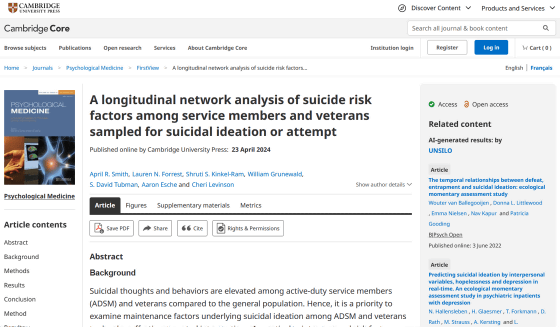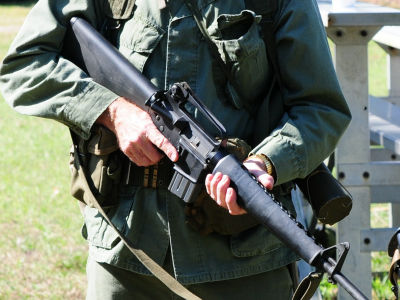Why do military personnel have such high suicide rates?

Although soldiers may lose their lives in conflicts and wars, the number of active and retired military personnel in the United States who die by suicide is overwhelmingly higher than those who die in combat. April
A longitudinal network analysis of suicide risk factors among service members and veterans sampled for suicidal ideation or attempt | Psychological Medicine | Cambridge Core
https://www.cambridge.org/core/journals/psychological-medicine/article/longitudinal-network-analysis-of-suicide-risk-factors-among-service-members-and-veterans-sampled-for-suicidal-ideation-or-attempt/6F6AAFA8A0080E67DD385F1F1856EF45

More military veterans and active duty service members are dying by suicide than in battle – understanding why can help with prevention
https://theconversation.com/more-military-veterans-and-active-duty-service-members-are-dying-by-suicide-than-in-battle-understanding-why-can-help-with-prevention-229876
Military suicide is a major problem in the United States, and according to a 2021 study , 7,057 military personnel died in military operations related to the September 11, 2001 terrorist attacks , but the number of active duty and veteran suicides who served in the same operations is estimated to be 30,177. In other words, about four times as many people died by suicide as in military operations.
Despite efforts to prevent suicide across the U.S. military, the suicide rate among military personnel remains high, with active duty military personnel at about twice the rate of other active duty military personnel and about 2.5 times the rate of the general population. Furthermore, the suicide rate among veterans is even higher, with more than 17 veterans estimated to die by suicide every day in 2021 (PDF file) .

Smith is researching why suicide rates are higher in certain groups, including military personnel. According to Smith, factors associated with suicide among active duty military personnel include 'loneliness,' 'interpersonal problems,' 'difficulty in the job,' 'trauma,' 'disruption of daily rhythm,' 'increased stress,' 'lack of sleep,' 'injury,' and 'chronic pain.' In addition to these factors, veterans may also be struggling with
Military personnel also have conditions that make them more susceptible to suicide than the general population: Military personnel who perform life-threatening jobs tend to have a lower fear of death, a higher tolerance for pain, and are more likely to be familiar with firearms and other lethal weapons and methods, making them more likely to complete a suicide attempt, Smith said.
In a 2024 study, Smith conducted a real-time study to track factors that lead to suicidal ideation among military personnel. In the study, 92 veterans were asked to install a survey app on their smartphones and fill out a short questionnaire four times a day for a month.
The survey results were analyzed using a statistical method called network analysis , which revealed that factors such as 'feelings of powerlessness,' 'feeling like a burden to others,' 'low sense of belonging,' 'alienation from others,' and 'emotional agitation' were strong short-term and long-term risk factors for suicidal ideation among military personnel, Smith said.

These findings allow us to consider the practices and circumstances that increase the risk of suicide among military personnel. For example, technological advances that weaken connections between military personnel can lead to a decreased sense of belonging and an increased sense of alienation, which can increase suicidal thoughts. In addition, a hectic schedule can reduce the time to reflect on one's work, which can increase feelings of helplessness.
Smith argues that military leaders could encourage a greater sense of belonging and less feelings of helplessness by prioritizing group-level achievement over individual achievement, and that relaxation techniques such as massage could reduce psychological agitation and lower the risk of suicide.
Related Posts:
in Science, Posted by log1h_ik







